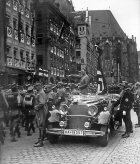Historical Argument
One of the most widely shared misconceptions among young people is that there can be one ‘true’ story of the past and that the value of any given interpretation depends on how closely it approximates to this ideal account. Enabling students to recognise that what historians are actually doing when they write about the past is advancing a series of claims – presenting and defending an argument – will help them not only in handling different interpretations but also in improving their own writing. Read more
-

Move Me On 144: Defines GCSE teaching in terms of a diet of practice exam questions
ArticleClick to view -

Strategies for A-Level marking to motivate and enable
ArticleClick to view -

Historiography from below: how undergraduates remember learning history at school
ArticleClick to view -

Chatting about the sixties: historical reasoning in essay-writing
ArticleClick to view -

Designing learning activities to stimulate domain-specific thinking
ArticleClick to view -

Active Historical Thinking
ArticleClick to view -

Slaying dragons and sorcerers in Year 12: in search of historical argument
ArticleClick to view -

Challenging not balancing: developing Year 7's grasp of historical argument through online discussion and a virtual book
ArticleClick to view -

How to make historical simulations adaptable, engaging and manageable
ArticleClick to view -

What's your claim: Developing pupils' historical argument skills using asynchronous text based computer conferencing
ArticleClick to view -

Asses, archers and assumptions: strategies for improving thinking skills in history in Years 9 to 13
ArticleClick to view -

The Tudor Monarchy in crisis: using a historian's account to stretch the most able students in Year 8
ArticleClick to view -

Does the linguistic release the conceptual? Helping Year 10 to improve their casual reasoning
ArticleClick to view -

Nutshell 105
ArticleClick to view -

Beyond 'I speak, you listen boy!' Exploring diversity of attitudes and experiences through speaking and listening
ArticleClick to view -

Democracy is not boring
ArticleClick to view -

Getting ready for the Grand Prix: Learning how to build a substantial argument in year 7
ArticleClick to view -

Frameworks for linking pupils' evidential understanding with growing skill in structured, written argument: the 'evidence sandwich'
ArticleClick to view -

SHP and 'What is history?'
ArticleClick to view

